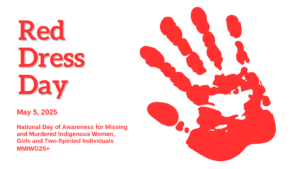
- This event has passed.
Red Dress Day

May 5 is Red Dress Day — a day to honour and remember our mothers, daughters, sisters and friends who are Missing and Murdered Indigenous Women, Girls, and 2SLGBTQQIA+ peoples (MMIWG2S+).
Each red dress hung or worn is a powerful symbol — a tribute to those taken, and a call for justice in the face of violence and systemic injustice fueled by the colonial ideology that continues to hurt our society.
Wear red this Monday in solidarity with Indigenous communities across Manitoba and Canada.
We commit to raising our voices to end the violence and build a future rooted in respect and safety for all.
Here’s how you can participate and help raise awareness:
🔴 Wear red — a shirt, dress, accessory
🔴 Display a red dress in your window or workspace
🔴 Attend a local community event
🔴 Talk with friends and family about the realities facing Indigenous Women, Girls, Two-Spirit, and Gender-Diverse Peoples
Origins of Red Dress Day
The roots of Red Dress Day can be traced back to the powerful art project of Canadian Métis artist Jaime Black. In 2010, Black initiated the “REDress Project” as a visual reminder of the staggering number of missing and murdered Indigenous women across Canada. Black hung red dresses in public spaces, from trees to lamp posts, creating a stark contrast against the landscape, evoking both sorrow and resilience.
What started as an art installation soon morphed into a movement. Indigenous Peoples, allies and advocates across Canada and beyond embraced the symbolic red dress as a rallying cry for awareness and action. Red Dress Day emerged as an annual event, bringing people together to honor the lives lost and demand justice for the victims and their families.
Events:
The Southern Chiefs’ Organization (SCO) has compiled a list of events for Red Dress Day.
Resources:
The Canadian Museum for Human Rights has some resources for Missing and Murdered Indigenous Women, Girls and 2SLGBTQI+ People.
CBC has some Red Dress Day info for Kids.
For Support:
Toll free 24/7 support line, 1-844-413-6649, in English, Anishnaabemowin (Ojibway), Cree, Inuktitut and French.
Indian Residential Schools Help Line, 1-866-925-4419. Available 24/7 for anyone experiencing pain or distress as a result of their residential school experience.
To Learn:
National Inquiry into Missing and Murdered Indigenous Women and Girls, Reclaiming Power and Place: The Final Report of the National Inquiry into Missing and Murdered Indigenous Women and Girls, two volumes, 2019: https://www.mmiwg-ffada.ca/final-report/
Watch the film Highway of Tears
Read the six-part series sharing stories, history, and information written by Indigenous journalist Brandi Morin.
